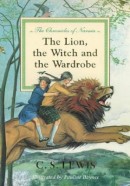 In a thoughtful piece at the Jewish Review of Books, Michael Weingrad wonders why, “I cannot think of a single major fantasy writer who is Jewish, and there are only a handful of minor ones of any note. To no other field of modern literature have Jews contributed so little. So why don’t Jews write more fantasy literature? And a different, deeper but related question: why are there no works of modern fantasy that are profoundly Jewish in the way that, say, The Lion, the Witch, and the Wardrobe is Christian?”
In a thoughtful piece at the Jewish Review of Books, Michael Weingrad wonders why, “I cannot think of a single major fantasy writer who is Jewish, and there are only a handful of minor ones of any note. To no other field of modern literature have Jews contributed so little. So why don’t Jews write more fantasy literature? And a different, deeper but related question: why are there no works of modern fantasy that are profoundly Jewish in the way that, say, The Lion, the Witch, and the Wardrobe is Christian?”
The experience of wonder, of joy and delight on the part of the reader, has long been recognized as one of the defining characteristics of the genre. This wonder is connected with a world, with a place of magic, strangeness, danger, and charm; and whether it is called Perelandra, Earthsea, Amber, or Oz, this world must be a truly alien place. As Ursula K. Leguin says: “The point about Elfland is that you are not at home there. It’s not Poughkeepsie.”
To answer the question of why Jews do not write fantasy, we should begin by acknowledging that the conventional trappings of fantasy, with their feudal atmosphere and rootedness in rural Europe, are not especially welcoming to Jews, who were too often at the wrong end of the medieval sword. Ever since the Crusades, Jews have had good reasons to cast doubt upon the romance of knighthood, and this is an obstacle in a genre that takes medieval chivalry as its imaginative ideal.
It is not only that Jews are ambivalent about a return to an imaginary feudal past. It is even more accurate to say that most Jews have been deeply and passionately invested in modernity, and that history, rather than otherworldliness, has been the very ground of the radical and transformative projects of the modern Jewish experience. This goes some way towards explaining the Jewish enthusiasm for science fiction over fantasy (from Asimov to Silverberg to Weinbaum there is no dearth of Jewish science fiction writers).

